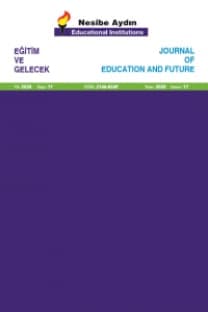Sema Yüzbaşıoğlu ** Cem Babadoğan
ders araştırması, mesleki gelişim, işbirliği, zümre, müfettişlik
Recommendations of Participating Teachers on the Application of Lesson Study in Turkey
-,
___
- Chen, X. &Yang, F. (2013). Chinese teachers’ reconstruction of the curriculum reform through lesson study. International Journal for Lesson and Learning Studies, 2 (3), 218-219.
- Chichibu, T. & Kihara, T. (2013). How Japanese schools build a professional learning community by lesson study. International Journal for Lessonand Learning Studies, 2 (1), 12-25.
- Creswell, J. W. (2003). Research design: Qualitative, quantitative, and mixed methods approaches. Thousand Oaks, CA: Sage Publications, USA.
- Delandshere, G. & Petrosky, A. (2004). Political rationales and ideological stances of the standards-based reform of teacher education in the USA. Teaching and Teacher Education, 20, 1–15
- Dudley, P. (2012). Lesson study development in England: From school networks to national policy. International Journal for Lesson and Learning Studies, 1 (1), 85-100. Emerald. Group Publishing Limited 2046-8253 DOI 10. 1108/20468251211179722
- Gero, G. (2015). The prospects of lesson study in the US the teacher support and comfort within a discrict culture of control. International Journal of Lesson and Learning Studies, 4 (1), 7–22. Emerald Group Publishing Limited 2046-8253 DOI 10.1108/IJLLS-02 2014-0007.
- Henson, K. T. (1995). Curriculum development for education reform. Addison - Wesley Educational Publisher. USA.
- Karadimitriou, K., Rekalidou, G., & Moumoulidou, M. (2014). The Practicum in Pre-service Teachers’s Education in Greece: The Case of Lesson Study. Procedia - Social and Behavioral Sciences, 152, 808–812. Elsevier Ltd. http://creativecommons.org/licenses/by-nc-nd/3.0/
- Küçük, M., Ayvacı, H. Ş. & Altıntaş, A. (2004). Zümre öğretmenler kurulu toplantı kararlarının eğitim ve öğretim uygulamaları üzerindeki yansımaları. XIII. Ulusal Eğitim Bilimleri Kurultayı, 6-9 June. İnönü University, Malatya.
- Lewis, C., Perry, R. & Murata, A. (2006). How should research contribute to instructional improvement? The case of lesson study. Educational Researcher, 35 (3), 3-14.
- Lewis, C. & Tsuchida, I. (1997). Planned educational change in Japan: The case of elementary science instruction. J. Educational Policy, 12 (5), 313–331.
- Lewis, C. & Tsuchida, I. (1998). A lesson is like a swiftly flowing river: How research lessons improve Japanese education. American Educator, Winter, 12–17, 50–52.
- Linn, M.C., Lewis, C., Tsuchida, I. & Songer, N. B. (2000). Beyond fourth-grade science: Why do US and Japanese students diverge? Educational Researcher, April, 4–14.
- Marshall, C. & Rossman G. B. (2006). Designing qualitative research. Fourth Edition. Thousand Oaks, CA: Sage Publications.
- Murata, A. & Takahashi, A. (2002). Proceedings of the annual meeting of the North American chapter of the international group for the psychology of mathematics education. 24th, Athens, GA, October 26-29, 1-4; see SE 066887.
- Özen, R. (2004). Hizmet içi eğitim programlarında görev alan öğretim elemanlarının yeterliklerine ilişkin kursiyerlerin görüşleri. XIII. Ulusal Eğitim Bilimleri Kurultayı, 6-9 June. İnönü University, Malatya.
- Patton, M.Q. (2002). Qualitative research & evaluation methods. 3th Edition. Sage Publications. USA.
- Plano Clark, V. L. & Creswell, J.W. (2008). The mixed methods reader. Thousand Oaks, CA: Sage Publications.
- Posner, G. J. & Rudnitsky, A. N. (2001). Course design: A guide to curriculum development for teachers. Longman. USA.
- Rakow, S. R. (2008). Standards-based v. standards-embedded curriculum: Not just semantics! Gifted Child Today, 31 (1), 44-49.
- Trapero, N. P. (2013). Lesson study and practical thinking: A case study in Spain. International Journal of Lesson and Learning Studies, 2 (2), 115–136. Emerald Group Publishing Limited 2046-8253 DOI 10.1108/20468251311323379
- Uçar, R. & İpek, C. (2006). İlköğretim okullarında görev yapan yönetici ve öğretmenlerin MEB hizmetiçi eğitim uygulamalarına ilişkin görüşleri. Yüzüncü Yıl Üniversitesi Eğitim Fakültesi Dergisi, 3 (1), 34–53.
- Wiggins, G. & McTighe, J. (2005). Understanding by design. (Expanded Second Edition). Alexandria, VA, USA.
- Wiles, J. & Bondi, J. (2007). Curriculum development: A guide to practice. New Jersey. USA: Pearson Merrill Prentice Hall (Seventh Edition).
- Yalın, İ. H. (2001). Hizmetiçi eğitim programlarının değerlendirilmesi. Milli Eğitim Dergisi, 150. http://yayim.meb.gov.tr/dergiler/150/yalin.htm
- Yang, Y. & Ricks, T. E. (2012). How crucial incidents analysis support Chinese lesson study. International Journal for Lesson and Learning Studies, 1 (1), 41-48.
- ISSN: 2146-8249
- Yayın Aralığı: 1
- Başlangıç: 2012
- Yayıncı: Nesibe Aydın Eğitim Kurumları
Ş. Dilek Belet Boyacı* E. Aysın Küçükyılmaz** Berrin Genç-Ersoy
Ş. Dilek Belet Boyacı, E. Aysın Küçükyılmaz, Berrin Genç-Ersoy
Keman Eğitiminde Bilişsel Bir Yaklaşım
Ways of Using Internet by Classroom Teachers in Social Studies Course
Tuğba Selanik Ay, Handan Deveci
An Analysis Regarding the Opinions of Teachers of What Kind of Students They Want
Eğitimde Rap Müzik: Bir Ön Çalışma
Sema Yüzbaşıoğlu ** Cem Babadoğan
Sema Yüzbaşıoğlu, Cem Babadoğan
Meral Güven** H. Özge Bahar-Güner
Meral Güven, H. Özge Bahar-Güner
